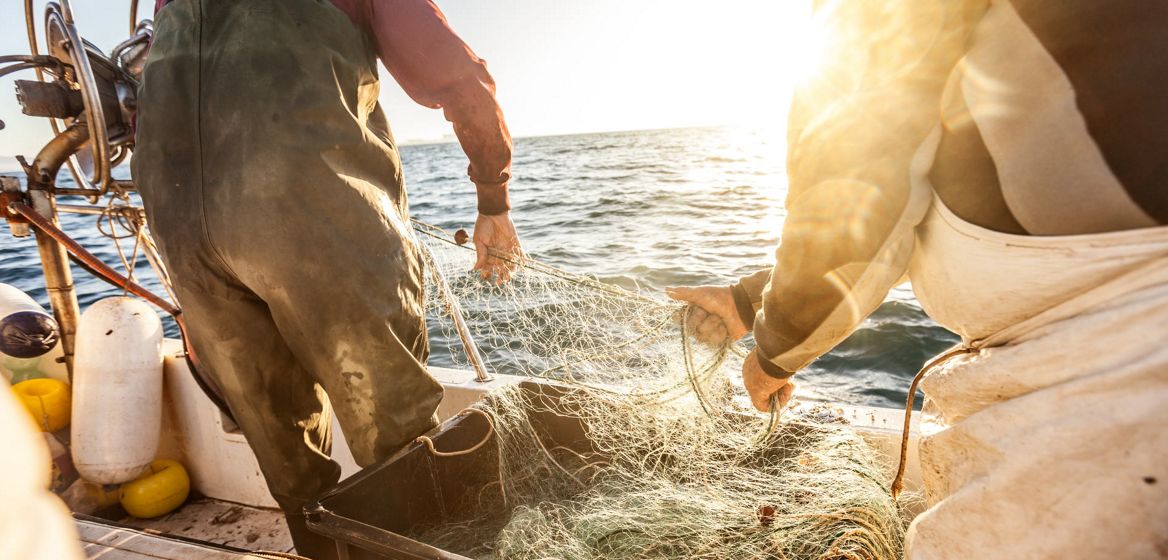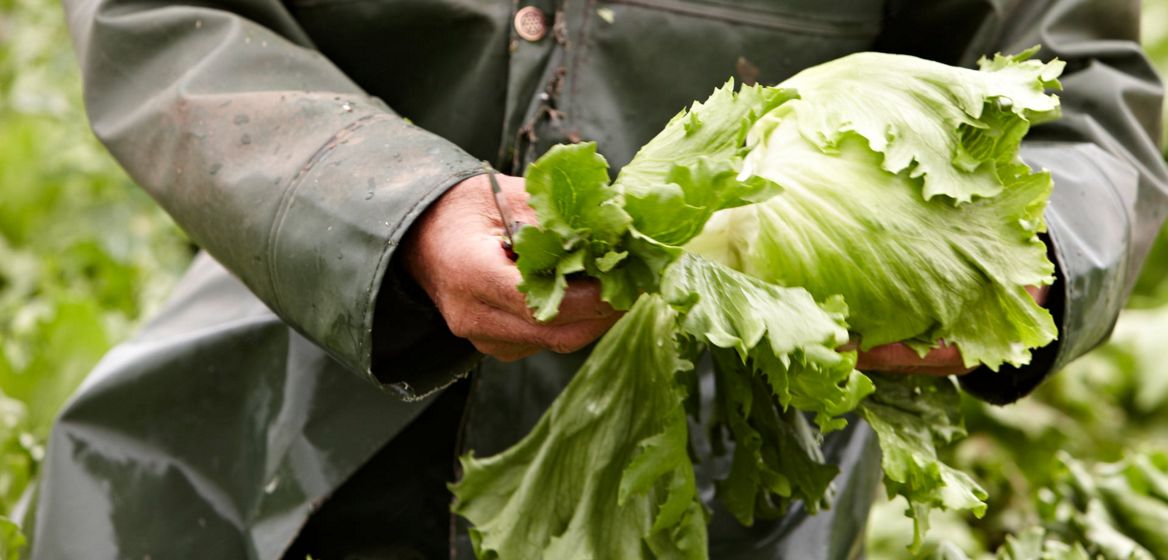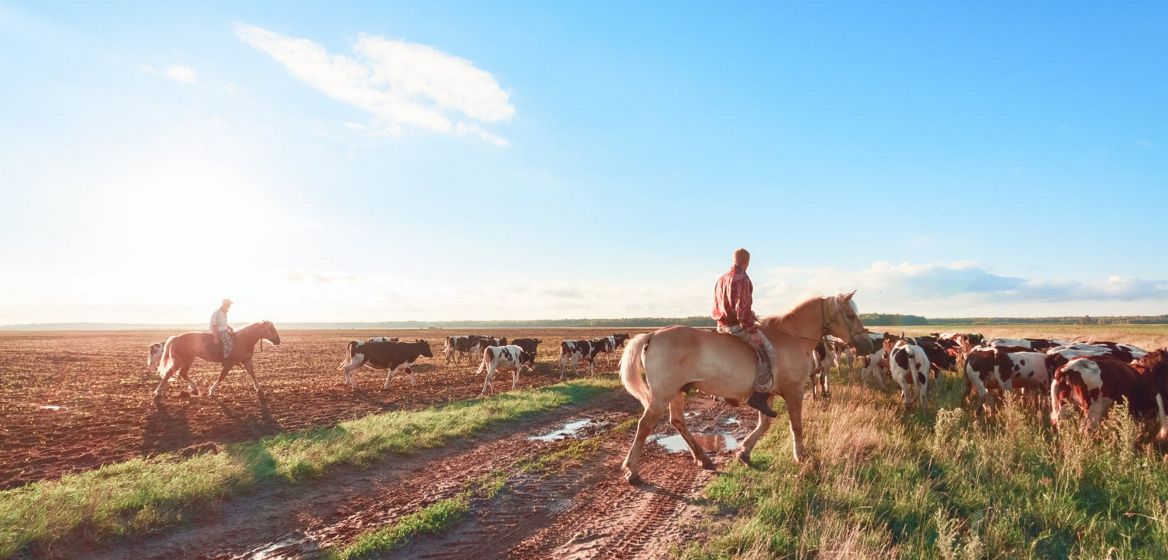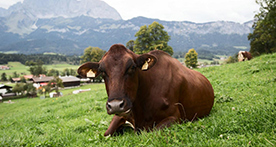Responsible Sourcing
We aim to use our scale and influence to help positively impact the animals and people connected to our supply chain, and our planet. We believe we can have the greatest impact when sourcing our priority commodities: beef, soy for chicken feed, fiber, palm oil, fish and coffee.
The road to serving McDonald’s menu items that delight customers is long and complex. Our global supply chain spans countries, continents and industries while also sourcing from local farmers, ranchers and producers near the communities where we serve and delight customers in our restaurants every day. We approach responsible sourcing holistically, understanding that our work can impact the livelihoods of people, the health of our shared planet and the well-being of animals. We believe we must respect them all.
On this page, you’ll find information about our approach to responsible sourcing and links to related topics. For our progress and performance relating to responsible sourcing, see the Goal Performance & Reporting page, where you’ll find our latest Purpose & Impact Report.
Our Strategy
Our global supply chain presents a range of opportunities and risks to manage our business and how we impact environmental and social topics such as land, water, animals and people. In the spirit of one of the Company’s core values, Integrity – We do the right thing, our responsible sourcing approach supports the Company’s long-term goal to continue providing quality food to customers while helping to advance more sustainable and resilient food systems globally.
We take a two-pronged approach to responsible sourcing. On one side, we seek to enhance the potential positive impacts of the Company’s supply chain – on topics such as the livelihoods of those who produce our food and the well-being of the planet and animals we rely on – by progressing against our wider Impact Strategy. On the other side, we consider and manage risks that could impact supply chain resiliency and our ability to maintain a reliable supply to our restaurants and offices.
We aim to deliver responsible sourcing programs that drive lasting, meaningful outcomes on the environmental and social issues that are critical to the Company. To enable this, we focus on several topics: animal health & welfare; human rights; business resilience; and nature, forests & water.
The Company requires that all beef sourced in high-priority origins for McDonald’s products meets the requirements of our Deforestation-Free Beef Procurement Policy (PDF – 214 KB). Beef sourced from high-priority origins is geo-monitored for environmental and social criteria, with results reported annually.1
Driving Supply Chain Resilience
When it comes to driving resilience, we think and act holistically, considering the whole McDonald’s System. This includes our supply chain and how we secure raw materials. Effective supply chain management is vital to our success, and we are developing and deploying technologies that enhance our understanding of potential supply chain risks to enable more timely decision-making.
Read more about our comprehensive approach on our Business Resilience page.
Strengthening Policies & Expectations
We believe embedding responsible sourcing standards across our global supply chain requires a targeted approach and collaborative effort from McDonald’s, our suppliers and industry peers. We set policies that clearly detail the Company’s expectations for its supply chain. We also engage with industry organizations and other relevant stakeholders to promote responsible sourcing across our wider industry.
Investing in Transformation Projects for Resilience, Social & Environmental Impact
We advocate for regenerative agriculture, set commitments that help support our responsible sourcing efforts and invest strategically in projects to transform key commodity supply chains.
Advancing Regenerative Agriculture Principles
We believe regenerative agriculture has the potential to drive action against a series of risks and opportunities to the Company, as well as the potential to deliver benefits for a wide range of stakeholders. That is why we are making the adoption of regenerative agriculture principles within certain categories of the Company’s supply chain a long-term, global priority for McDonald’s and a key step in our responsible sourcing efforts.
We also believe regenerative agriculture on farms and ranches can help address various environmental and social issues, including:
- Building a thriving food system that is increasingly resilient to climate change and other variables that impact a safe, assured food supply.
- Enhancing wildlife habitats and increasing biodiversity.
- Helping tackle climate change by building healthier, more productive soil that better sequesters carbon and is more drought and flood resilient.
- Decreasing use and long-term need for chemical inputs.
- Improving water aeration and retention, and fostering cleaner, safer runoff.
- Supporting farmer livelihoods, enhancing farmer prosperity and making processes more resilient in the long run.
Informed by our Regenerative Agriculture Framework, we are working with some of our suppliers, farmers, ranchers and other stakeholders to introduce or scale regenerative principles.
In working to understand and share our producers’ achievements, our Flagship Farmers Program helps amplify the voices of farmers who are leading the industry with pioneering sustainability practices. The program is a resource for producers worldwide to explore innovative solutions for soil health, more sustainable grazing techniques, biodiversity, ecosystem protection, emissions reductions and animal welfare.
Palm Landscape Initiative
In Indonesia, we are engaging with SUSTAIN KUTIM, a palm oil sustainable landscape initiative, together with strategic partner Proforest, GIZ and several company funders to help reduce forestry and land-use emissions in Kutai Timur while supporting local communities, primary producers, palm oil and rubber plantation workers and the East Kutai district government.
Enhancing Positive Impact
We believe our supply chain can be a force for environmental and social good. To harness this potential, we develop programs and pursue strategic partnerships that help advance progress on topics such as the livelihoods of those who produce our food and the well-being of the planet and animals we rely on.
Advancing Beef Sustainability
Engaging partners throughout our supply chain in collective action is key to addressing our sustainability priorities. Given the size and scale of our business, we believe we have an opportunity to help drive positive change across global food systems in collaboration with farmers, ranchers and producers.
Driving Change for Global Beef Supply Chains
We use our influence as a global business to help galvanize action and collaboration between suppliers, producers and others. McDonald’s policies, standards and specifications for raw materials and finished products outline our expectations of our beef suppliers. These include strict requirements for food safety and animal health and welfare, as well as employee workplace accountability. Suppliers are audited annually by third parties and must be compliant to retain their ability to supply McDonald’s. To support forest-positive beef sourcing, we have a Deforestation-Free Beef Procurement Policy (DFBPP), which includes detailed requirements for beef sourced from Argentina, Australia, Brazil and Paraguay.
We were a founding member of the Global Roundtable for Sustainable Beef (GRSB), an organization that convenes key stakeholders to advance, support and communicate continuous improvement in global beef value chain sustainability through leadership, science and multistakeholder engagement and collaboration. In our in-scope markets (Australia, Brazil, Canada, France, Germany, Ireland, New Zealand, Poland, the U.K. and the U.S.), we have helped establish multistakeholder roundtable groups together with farmers, suppliers, industry groups, academia, civil society and the GRSB. We also helped establish the European Roundtable for Beef Sustainability (ERBS), which involves five of our top markets, plus Italy.
Developing Programs to Measure & Scale Beef Sustainability
In addition to our regenerative grazing programs, we collaborate with key partners to develop and scale innovative approaches to beef production. We’ve worked alongside a diverse, global network of suppliers, nongovernmental organizations (NGOs) and scientists for over a decade. Through these efforts, we’ve collaborated with farmers and ranchers to support long-term livelihoods and resiliency, as well as to embed beef farming methods that protect and maintain native landscapes, improve biodiversity and sequester carbon in soils. See our Purpose & Impact Report on the Goal Performance & Reporting page for examples of our latest projects in this space.
Advancing Our Commitment on Forests & Natural Ecosystems
Learn about our commitment to forests and natural ecosystems on our Nature, Forests & Water page. Additionally, read more about how we are evolving our approach to fiber sourcing and use in packaging on our Packaging, Toys & Waste page.
We are committed to eliminating deforestation2 and addressing conversion3 in our global supply chains by 2030, for commodities and regions where we can deliver the greatest impact. See our latest Purpose & Impact Report on the Goal Performance & Reporting page for updates on our progress toward this goal.
Promoting Sustainable Coffee Sourcing
Read about our approach to coffee sourcing on our Nature, Forests & Water page.
We want customers to walk into any McDonald’s restaurant globally and enjoy an affordable, quality cup of coffee that benefits farming communities, supports a deforestation-free supply chain and is more sustainably sourced.4
We do this in a few ways, including:
- Sourcing coffee that is certified to international sustainability standards through organizations such as Rainforest Alliance, Fairtrade International and Fair Trade USA.
- Sourcing coffee from farms participating in approved roaster-led programs that comply with the McCafé Sustainability Improvement Platform (SIP) program.
How McCafé SIP Works
McCafé SIP was launched in 2016 with partners including Conservation International, the Committee on Sustainability Assessment (COSA) and an advisory panel comprising several other NGOs and certification bodies.
The program sets out the framework to engage and guide McDonald’s coffee supply chain in sustainable sourcing, as well as promote long-term investments by the McDonald’s System in coffee growers and their communities.
McCafé SIP provides visibility to coffee farms, enabling McDonald’s and participating roasters to invest in activities that meet the unique needs of each coffee-growing community in its supply chain.
In addition to mechanisms that provide greater confidence, McCafé SIP promotes transparency, allowing us to understand who grows our coffee; producer collaboration to provide relevant training and tools to farmer communities; and continuous improvements by which performance and progress toward improved social, environmental and economic standards can be measured.
Minimizing the Impacts of Palm Oil Sourcing
Read about our approach to palm oil sourcing on our Nature, Forests & Water page.
Palm oil produced for McDonald’s5 for use as restaurant cooking oil, supplier parfry oil or as an ingredient in a McDonald’s global core product must be certified by the Roundtable on Sustainable Palm Oil (RSPO).
McDonald’s is committed to working with stakeholders and the Company’s supply chain to support the development and improvement of a more sustainable palm oil production. We have engaged one of our major palm oil suppliers, Wilmar, on a series of projects to help improve transparency and sustainability outcomes for our supply chain, in collaboration with Proforest.
Wilmar and McDonald’s share a commitment to sustainably sourcing palm oil and supporting the delivery of NDPE (no deforestation, no expansion on peat and no exploitation) in palm oil production, having both been engaged in the development of the NDPE Implementation Reporting Framework (IRF), through our participation in the Palm Oil Collaboration Group (POCG).
Advancing Animal Health & Welfare
We believe we have a responsibility to help improve the health and welfare of animals in our supply chain and work with our global network of suppliers to actively encourage industry and cross-sector collaboration. We are taking action across our beef, broiler chicken, egg and pork supply chains to help ensure animals in our supply chains are properly cared for throughout their lives. This includes striving to maintain a responsible approach to antibiotic use.
Read in detail about how we’re advancing Animal Health & Welfare and Responsible Antibiotic Use.
Boosting Industry Sustainability for White Fish
McDonald’s believes that we have played an important role in helping improve the sustainability of the global white fish sector by implementing independently verified criteria for healthy fish stocks, impact on ecosystems, fisheries’ management and other key actions. We support global efforts to restore depleted fish stocks and conserve the marine environment, and we aim for all the wild-caught fish sourced for use in McDonald’s products to come from verified sustainable sources.
We work with organizations such as Sustainable Fisheries Partnership (SFP) and the Marine Stewardship Council (MSC) to identify ways to help improve the health of marine ecosystems and promote respect for human rights for the people working across our fish supply chain.
Footnotes
1 Beef. We continue to refine our calculation methodology, which may create potential inconsistencies with previously reported information. Scope: Includes volume from raw material suppliers (if in priority origins according to the McDonald’s Deforestation-Free Beef Procurement Policy) to beef suppliers to the McDonald’s System and all McDonald’s restaurants owned and operated by the Company and its Franchisees that sell beef. In 2024, the McDonald's System sourced 90% of its beef from low-priority origins under the McDonald’s Deforestation-Free Beef Procurement Policy. McDonald’s requires all beef raw material sourced from high-priority origins to adhere to McDonald’s Deforestation-Free Beef Procurement Policy and meet the requirements as outlined in McDonald’s Commitment on Forests and Natural Ecosystems. Countries with origins currently identified as high priority for beef include Argentina, Australia, Brazil and Paraguay. Exclusions: Grain-fed Australian beef and beef used as secondary ingredients in McDonald’s products; for example, as flavoring in a sauce.
2 “Eliminate deforestation” refers to action that McDonald’s, Franchisees and suppliers are taking to live out the McDonald’s Commitment on Forests and Natural Ecosystems (PDF – 126 KB). In alignment with the Accountability Framework, deforestation refers to: Loss of natural forest as a result of: (i) conversion to agriculture or other non-forest land use; (ii) conversion to a tree plantation; or (iii) severe and sustained degradation.
3 As aligned with Accountability Framework Initiative, conversion refers to: change of a natural ecosystem to another land use or profound change in a natural ecosystem’s species composition, structure or function.
4 Coffee. Scope: Includes all ground and whole bean coffee, including decaffeinated coffee, used in espresso-based drinks and coffee brewed at McDonald’s restaurants, and all ground and whole bean coffee in McDonald’s-branded retail products. Includes all suppliers of coffee to the McDonald’s System. Market scope includes all McDonald’s restaurants owned and operated by the Company and its Franchisees that sell coffee, and retail outlets selling McDonald’s-branded coffee products. Countries with regions currently identified as high-deforestation priority regions for coffee include Honduras, Indonesia and Vietnam. McDonald’s requires all coffee sourced from these regions to be Rainforest Alliance Certified. Exclusions: Coffee extracts and ingredients used in products such as frappés and coffee in baked goods; coffee in cold brew drinks if they are brewed off-site; coffee extract in ready-to-drink retail products; and other locally sourced products containing coffee.
5 Palm oil. Scope: Includes all palm oil (including crude palm oil, palm kernel oil, derivatives and fractions) sourced for McDonald’s restaurants for use as restaurant cooking oil and all palm oil sourced by McDonald’s suppliers and used directly as an ingredient in a McDonald’s product and listed on the product’s ingredient statement. Includes all suppliers of products containing palm oil in the McDonald’s System and all McDonald’s restaurants owned and operated by the Company and its Franchisees that use palm oil. All countries are currently identified as high-deforestation priority regions for palm oil and all volumes are required to be covered by RSPO certification or credits. All RSPO supply chain models applicable to RSPO are applicable to McDonald’s ‒ RSPO Identity Preserved (IP), RSPO Segregated (SG), RSPO Mass Balance (MB) and Book and Claim (BC) ‒ although McDonald’s is committed to increasing traceability by specifying physical certification for the palm oil used in the McDonald’s System in the greatest volumes (IP, SG or MB). Exclusions: Palm oil, palm kernel oil or their derivative used as secondary ingredients in McDonald’s products. This is when palm oil is used as an ingredient within an ingredient, for example, an emulsifier.
Latest Stories







